exercise的用法_用法辨析 英语语法.doc
关于exercise的用及解释

关于exercise的用及解释exercise的用法在英语中是比较常见的一个单词,也是容易混淆的知识点之一,接下来小编在这里给大家带来exercise的用法,我们一起来看看吧!exercise的用法1. exercise作可数名词用,表示“练习,习题,体操,功课,操练”等,常用复数。
I'm doing my exercises. 我在做练习/功课。
Doing morning exercises is helpful to our health. 做早操对我们的健康是有益的。
You should do more spelling exercises. 你应该做更多的拼写练习。
2.作不可数名词用,表示“锻炼,运动”。
You are weak because of the lack of exercise. 你身体弱是因为缺少锻炼。
Take more exercise, and you will be healthy. 多多锻炼,你会健康的。
exercise的相关解释n. 练习;运动,训练;运用;典礼vi. 锻炼,训练,练习;vt. 锻炼(身体某部位);使焦虑,使忧虑;实行,发挥(作用);运用exercise的例句1. His exercise books were full of well deserved red ticks.他的练习本上尽是些红钩钩,都是他应得的。
2. Swimming is probably the best form of exercise you can get.游泳或许是现有的最佳锻炼方式。
3. A bit of exercise will help lift his spirits.进行一点儿体育锻炼能帮助他改善情绪。
4. Lack of exercise can lead to feelings of depression and exhaustion.缺乏锻炼会导致抑郁和疲劳。
人教版英语八年级上册 Unit 2 How often do you exercise语法、词汇归纳
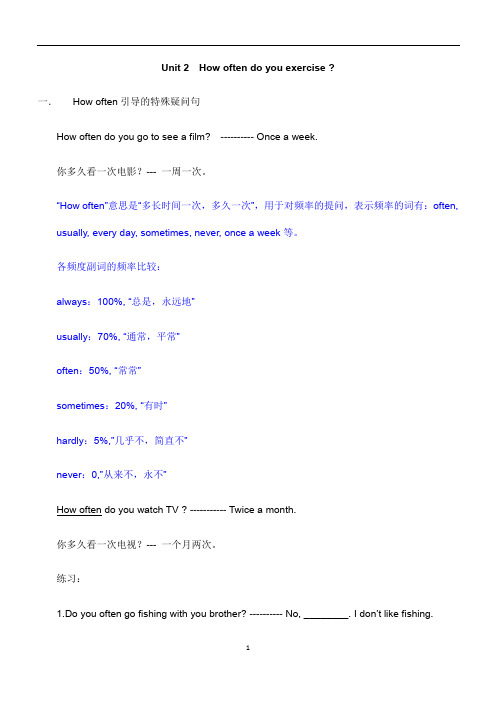
Unit 2 How often do you exercise ?一.How often引导的特殊疑问句How often do you go to see a film? ---------- Once a week.你多久看一次电影?---一周一次。
“How often”意思是“多长时间一次,多久一次”,用于对频率的提问,表示频率的词有:often, usually, every day, sometimes, never, once a week等。
各频度副词的频率比较:always:100%, “总是,永远地”usually:70%, “通常,平常”often:50%, “常常”sometimes:20%, “有时”hardly:5%,”几乎不,简直不”never:0,”从来不,永不”How often do you watch TV ? ----------- Twice a month.你多久看一次电视?---一个月两次。
练习:1.Do you often go fishing with you brother? ---------- No, ________. I don’t like fishing.A. alwaysB. neverC. often2.How often do you visit your grandma? ----------- _______________.A. Two timesB. Twice a weekC. Last week答案:1.B 翻译:你经常和你哥哥一起钓鱼吗?---不,从不。
我不喜欢钓鱼。
2.B 翻译:你多久去看一次你奶奶?---一周两次。
二.have to .VS. Musthave to : 必须,不得不,强调客观需要must: 必须,强调主观愿望和看法We have to finish the work before lunch.我们不得不在午饭前完成这个工作。
exercise的用法总结初中
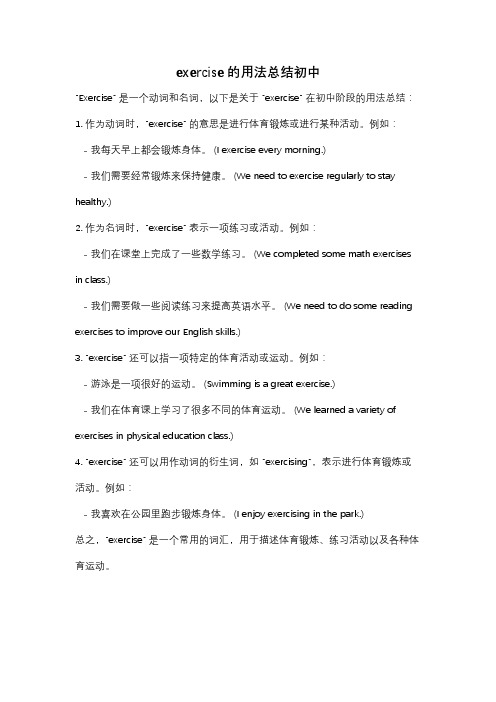
exercise的用法总结初中"Exercise" 是一个动词和名词,以下是关于 "exercise" 在初中阶段的用法总结:1. 作为动词时,"exercise" 的意思是进行体育锻炼或进行某种活动。
例如:- 我每天早上都会锻炼身体。
(I exercise every morning.)- 我们需要经常锻炼来保持健康。
(We need to exercise regularly to stay healthy.)2. 作为名词时,"exercise" 表示一项练习或活动。
例如:- 我们在课堂上完成了一些数学练习。
(We completed some math exercises in class.)- 我们需要做一些阅读练习来提高英语水平。
(We need to do some reading exercises to improve our English skills.)3. "exercise" 还可以指一项特定的体育活动或运动。
例如:- 游泳是一项很好的运动。
(Swimming is a great exercise.)- 我们在体育课上学习了很多不同的体育运动。
(We learned a variety of exercises in physical education class.)4. "exercise" 还可以用作动词的衍生词,如 "exercising",表示进行体育锻炼或活动。
例如:- 我喜欢在公园里跑步锻炼身体。
(I enjoy exercising in the park.)总之,"exercise" 是一个常用的词汇,用于描述体育锻炼、练习活动以及各种体育运动。
exercise的用法总结
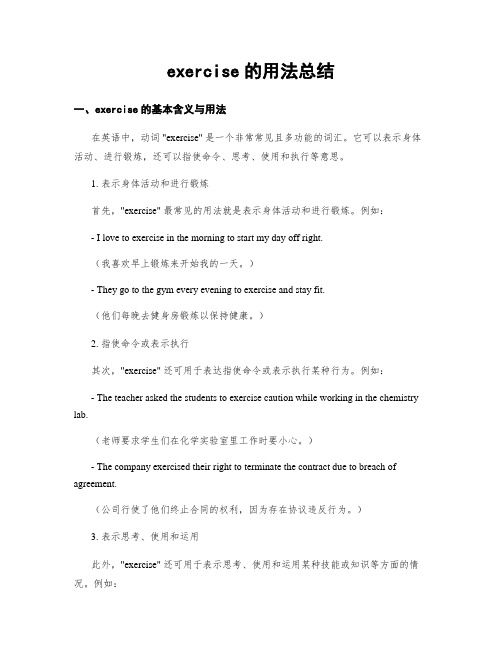
exercise的用法总结一、exercise的基本含义与用法在英语中,动词 "exercise" 是一个非常常见且多功能的词汇。
它可以表示身体活动、进行锻炼,还可以指使命令、思考、使用和执行等意思。
1. 表示身体活动和进行锻炼首先,"exercise" 最常见的用法就是表示身体活动和进行锻炼。
例如:- I love to exercise in the morning to start my day off right.(我喜欢早上锻炼来开始我的一天。
)- They go to the gym every evening to exercise and stay fit.(他们每晚去健身房锻炼以保持健康。
)2. 指使命令或表示执行其次,"exercise" 还可用于表达指使命令或表示执行某种行为。
例如:- The teacher asked the students to exercise caution while working in the chemistry lab.(老师要求学生们在化学实验室里工作时要小心。
)- The company exercised their right to terminate the contract due to breach of agreement.(公司行使了他们终止合同的权利,因为存在协议违反行为。
)3. 表示思考、使用和运用此外,"exercise" 还可用于表示思考、使用和运用某种技能或知识等方面的情况。
例如:- You should exercise critical thinking skills when analyzing complex problems.(当分析复杂问题时,你应该运用批判性思维技能。
)- The detective carefully exercised his reasoning abilities to solve the murder case.(侦探小心地运用推理能力来解决谋杀案。
中考英语 常用词汇详解
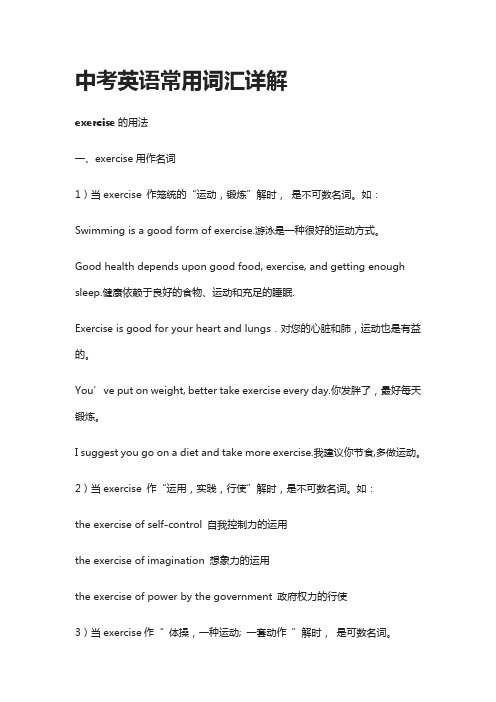
中考英语常用词汇详解exercise的用法一、exercise用作名词1)当exercise 作笼统的“运动,锻炼”解时,是不可数名词。
如:Swimming is a good form of exercise.游泳是一种很好的运动方式。
Good health depends upon good food, exercise, and getting enough sleep.健康依赖于良好的食物、运动和充足的睡眠.Exercise is good for your heart and lungs.对您的心脏和肺,运动也是有益的。
You’ve put on weight, better take exercise every day.你发胖了,最好每天锻炼。
I suggest you go on a diet and take more exercise.我建议你节食,多做运动。
2)当exercise 作“运用,实践,行使”解时,是不可数名词。
如:the exercise of self-control 自我控制力的运用the exercise of imagination 想象力的运用the exercise of power by the government 政府权力的行使3)当exercise作“体操,一种运动; 一套动作”解时,是可数名词。
We do morning exercises every morning. 我们每天上午做早操。
It's good to do eye exercises. 做眼保健操是有好处的。
I do physical exercises every day. 我每天都锻练身体。
Repeat the exercise ten times on each leg.每条腿重复做十次这种动作。
4)当exercise作“练习,习题;实习;(军)演习,操练;”时,是可数名词”。
初中英语语法现在完成时练习题答案

一、时态讲解:现在完成时( 1)构成:现在完成时由助动词have + 过去分词构成,助动词have 有人称和数的变化。
第三人称单数用has,其余用 have.现在完成时的否定式直接在助动词后面加上not、疑问式是把助动词提到主语之前。
以study 为例,其否定式、疑问式和简单回答形式如下:否定式疑问式I have not (havenYou have not (havenHe has not (hasn ’ t) studied’ t) studied’ t) studied⋯.⋯.⋯.Have IstudiedHave youstudiedHas hestudied⋯?⋯?⋯?否定疑问式Have I not (Haven’ t I) studied Have you not (Haven’ t you) studied Has he not (Hasn’ t he) studied⋯?⋯?⋯?简单回答(肯定/否定)Yes,youhave.No, you haven Yes, I have. No,I haven Yes, he has. No, hehasn ’ t.’ t.’ t.( 2)用法:1)现在完成时通常表示在说话之前已经完成的动作或存在的状态。
说话人强调的是该动作或状态对现在的结果或影响。
My daughter has just gone out. 我女儿刚出去。
I ’ m sure we’ ve met before我肯.定我们以前见过面。
She has arrived. 她到了。
2)表示持续到现在的动作或状态,往往和包括现在在内的表示一段时间的状语连用,如 recently, already, just, lately, for ⋯, sinceyet⋯,等。
如:I haven’ t heard from her these days这.些日子我没有收到她的信。
We haven ’ t seen you recently.最近我们没有见到你。
八年级英语上册Unit2Howoftendoyouexercise课件(新版)人教新目标版

swims very well.
A. exercise
B. exercises
C. do exercise D. does exercises
要点梳理
(
A
)2. Tom does eye _____ in the classroom
after doing math _____ for half an hour.
3. How come?
为什么呢?/怎么会呢? ___________________________________________
4. What kind of dance are you learning?
你正在学习哪种舞蹈? ___________________________________________
1. What do you usually do on weekends?
你周末通常做什么? ___________________________________________
课前导学 2. What’s your favorite program? 你最喜欢的节目是什么? ___________________________________________
5. Oh, I have to play tennis with my friends.
哦,我得跟朋友们打网球。 ___________________________________________
课前导学 单元语法 频率副词的使用以及what与how often 句型的提
问、回答;一般现在时态的用法
课前导学 maybe 8. ___________ adv. 大概;或许;可能 least 9. ___________ adv. 最小;最少 adj. & pron. 最小的;最少的
exercise用法及固定搭配
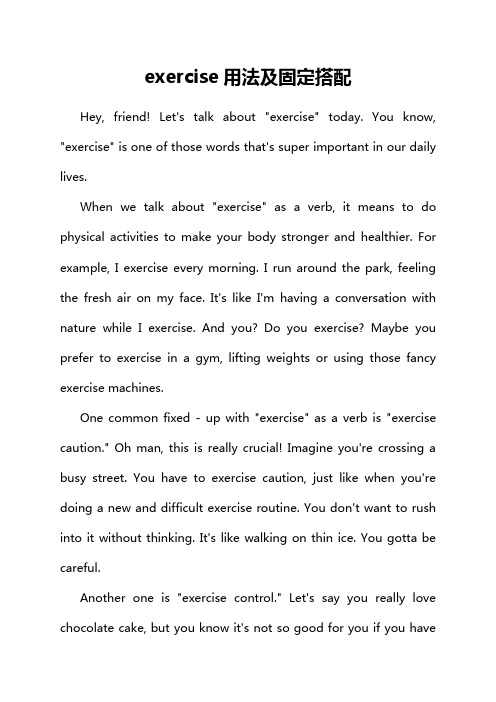
exercise用法及固定搭配Hey, friend! Let's talk about "exercise" today. You know, "exercise" is one of those words that's super important in our daily lives.When we talk about "exercise" as a verb, it means to do physical activities to make your body stronger and healthier. For example, I exercise every morning. I run around the park, feeling the fresh air on my face. It's like I'm having a conversation with nature while I exercise. And you? Do you exercise? Maybe you prefer to exercise in a gym, lifting weights or using those fancy exercise machines.One common fixed - up with "exercise" as a verb is "exercise caution." Oh man, this is really crucial! Imagine you're crossing a busy street. You have to exercise caution, just like when you're doing a new and difficult exercise routine. You don't want to rush into it without thinking. It's like walking on thin ice. You gotta be careful.Another one is "exercise control." Let's say you really love chocolate cake, but you know it's not so good for you if you havetoo much. So you need to exercise control over your desire to eat it all the time. It's a battle within yourself, like a little angel and a little devil sitting on your shoulders. The angel is telling you to exercise control, and the devil is saying "Just one more slice!"Now, when "exercise" is a noun, it refers to the activity itself. There are all kinds of exercises. There's aerobic exercise, like dancing or cycling. My sister loves aerobic exercise. She says it makes her feel like she has wings and can fly. And then there's strength - building exercise. My brother is all about that. He wants to look like those superheroes in the movies. He's always doing push - ups and sit - ups.A great fixed phrase with "exercise" as a noun is "do exercise." It's so simple yet so important. We should all do exercise regularly. If we don't, it's like leaving a beautiful garden uncared for. It'll just wither away. There's also "take exercise," which means pretty much the same thing. It's like choosing to take a journey to a healthier you.In a school or work setting, we often hear about "exercise books." These are the notebooks where we write down ourthoughts, our lessons, or our work tasks. It's a different kind of "exercise" in a way. It's like exercising our minds instead of our bodies. You know, like when you're trying to solve a really tough math problem. It's mental exercise.There are also some expressions related to exercise that are a bit more complex. For instance, "exercise one's rights." In a democratic society, we can exercise our rights to vote, to speak freely, and so on. It's like having a superpower, but we have to use it responsibly. If we don't exercise our rights, it's like having a magic wand but never using it. What a waste!Another one is "exercise an option." In the business world, people often have options in contracts. They can exercise an option to buy or sell something. It's like having a key to a treasure chest, but you have to decide when to use that key.Exercise is not just about getting fit physically. It can also be about improving our mental state. When I exercise, I feel less stressed. It's like all my worries are sweating out of me. And I'm sure you've felt that way too, or at least you will if you start exercising more.Some people think that exercise is a chore. Oh, come on! It's not like that at all. It's like a gift you give to yourself. It's time for you to focus on yourself, to improve yourself. You know those days when you just don't feel like doing anything? Well, that's when exercise can be your best friend. It'll pick you up and give you the energy you need.In conclusion, "exercise" whether as a verb or a noun, has a whole bunch of meanings and fixed phrases associated with it. It's an essential part of our lives, like the fuel in a car that keeps us going. So, don't be lazy. Get out there and exercise! Whether it's physical exercise to keep your body in shape or mental exercise to keep your mind sharp, it's all good.。
exercise 动词用法
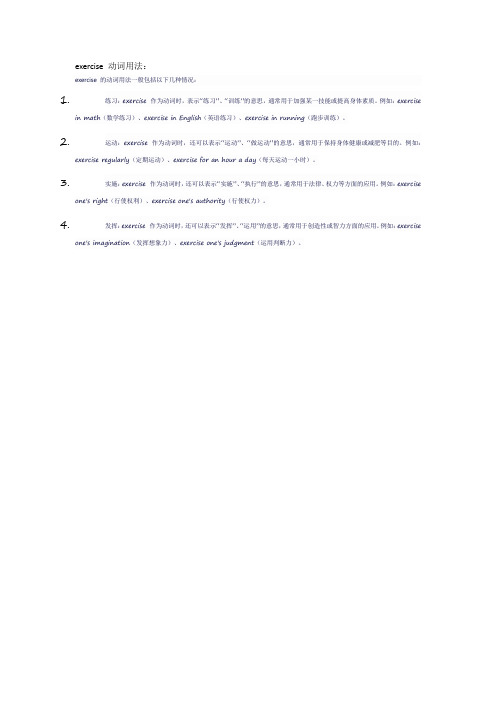
exercise 动词用法:
exercise 的动词用法一般包括以下几种情况:
1.练习:exercise 作为动词时,表示“练习”、“训练”的意思,通常用于加强某一技能或提高身体素质。
例如:exercise
in math(数学练习)、exercise in English(英语练习)、exercise in running(跑步训练)。
2.运动:exercise 作为动词时,还可以表示“运动”、“做运动”的意思,通常用于保持身体健康或减肥等目的。
例如:
exercise regularly(定期运动)、exercise for an hour a day(每天运动一小时)。
3.实施:exercise 作为动词时,还可以表示“实施”、“执行”的意思,通常用于法律、权力等方面的应用。
例如:exercise
one's right(行使权利)、exercise one's authority(行使权力)。
4.发挥:exercise 作为动词时,还可以表示“发挥”、“运用”的意思,通常用于创造性或智力方面的应用。
例如:exercise
one's imagination(发挥想象力)、exercise one's judgment(运用判断力)。
exercise的用法
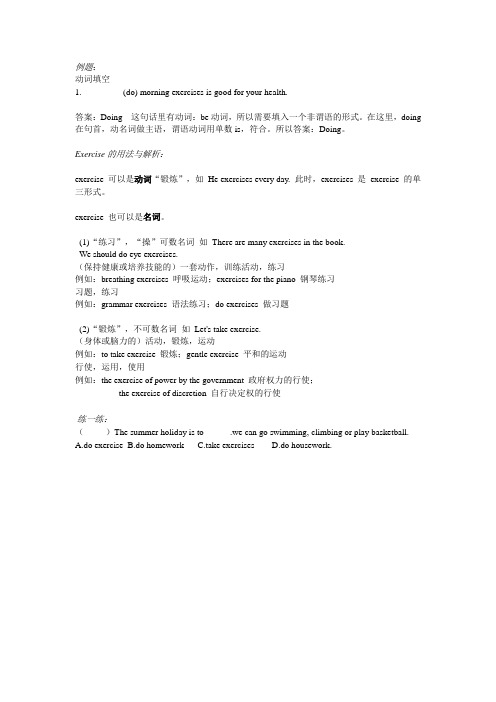
例题:动词填空1._______(do) morning exercises is good for your health.答案:Doing 这句话里有动词:be动词,所以需要填入一个非谓语的形式。
在这里,doing 在句首,动名词做主语,谓语动词用单数is,符合。
所以答案:Doing。
Exercise的用法与解析:exercise 可以是动词“锻炼”,如He exercises every day. 此时,exercises 是exercise 的单三形式。
exercise 也可以是名词。
(1)“练习”,“操”可数名词如There are many exercises in the book.We should do eye exercises.(保持健康或培养技能的)一套动作,训练活动,练习例如:breathing exercises 呼吸运动;exercises for the piano 钢琴练习习题,练习例如:grammar exercises 语法练习;do exercises 做习题(2)“锻炼”,不可数名词如Let's take exercise.(身体或脑力的)活动,锻炼,运动例如:to take exercise 锻炼;gentle exercise 平和的运动行使,运用,使用例如:the exercise of power by the government 政府权力的行使;the exercise of discretion 自行决定权的行使练一练:()The summer holiday is to______.we can go swimming, climbing or play basketball. A.do exercise B.do homework C.take exercises D.do housework.。
人教pep版八年级英语上册Unit2Howoftendoyouexercise短语语法知识点汇总

Unit 2 How often do you exercise一、必背短。
1.去看影go to the movies2.多久一次how often3.几乎从不hardly ever4.在周末on the weekend/on weekends5.一周一次once a week6.一周两次twice a week7.一个月三次three times a month8.使用互网use the internet9.充⋯be full of10.上琴have piano lessons11.不得不做某事have to do sth.12.帮助做家help with housework13.起码at least14.至多at most15.保持健康keep healthy/keep in good16⋯ .的果the result of ⋯health17.百分之二十twenty percent18.⋯ 有利be good for⋯19.⋯有害be bad for20.垃圾食品junk food21.多少个小how many hours22.做运play/do sports23.在某人空in one’s free time24.根本不;一点也不not⋯ at all25.⋯对于⋯ask⋯ about26.熬夜stay up late27.一个 16 的男孩 a 16-year-old boy28.超、多于more than29.少于less than30.放松的最好方式the best way to relax【教材内容分析】Section A1. What do you usually do on weekends? (P. 9)on weekends 意“在周末”,泛指每个周末,on the weekend 表示“在个周末”,特指某个周末;在英式英中,在周末也能够用at the weekend 或许 at weekends。
exercise的用法
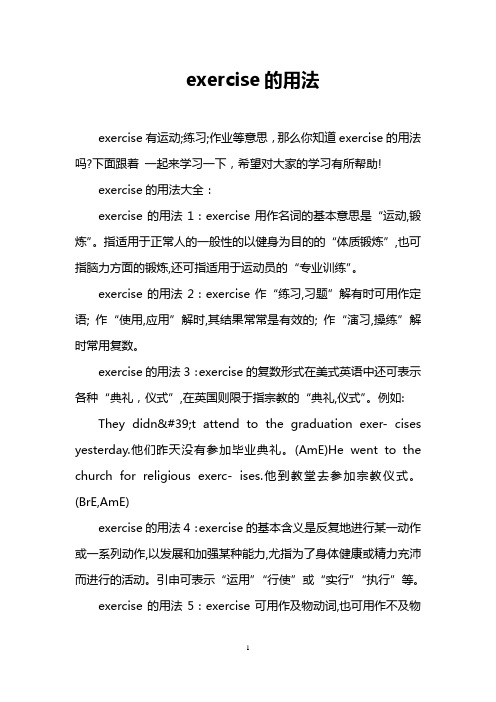
exercise的用法exercise有运动;练习;作业等意思,那么你知道exercise的用法吗?下面跟着一起来学习一下,希望对大家的学习有所帮助!exercise的用法大全:exercise的用法1:exercise用作名词的基本意思是“运动,锻炼”。
指适用于正常人的一般性的以健身为目的的“体质锻炼”,也可指脑力方面的锻炼,还可指适用于运动员的“专业训练”。
exercise的用法2:exercise作“练习,习题”解有时可用作定语; 作“使用,应用”解时,其结果常常是有效的; 作“演习,操练”解时常用复数。
exercise的用法3:exercise的复数形式在美式英语中还可表示各种“典礼,仪式”,在英国则限于指宗教的“典礼,仪式”。
例如: They didn't attend to the graduation exer- cises yesterday.他们昨天没有参加毕业典礼。
(AmE)He went to the church for religious exerc- ises.他到教堂去参加宗教仪式。
(BrE,AmE)exercise的用法4:exercise的基本含义是反复地进行某一动作或一系列动作,以发展和加强某种能力,尤指为了身体健康或精力充沛而进行的活动。
引申可表示“运用”“行使”或“实行”“执行”等。
exercise的用法5:exercise可用作及物动词,也可用作不及物动词。
用作及物动词时,接名词或代词作宾语。
exercise的用法6:exercise作“练习”解时,其后常接“反身代词+in+ n./v -ing”,其主语既是动作的执行者,又是动作的承受者。
exercise的用法例句:1. His exercise books were full of well deserved red ticks.他的练习本上尽是些红钩钩,都是他应得的。
2. Swimming is probably the best form of exercise you can get.游泳或许是现有的最佳锻炼方式。
exercise的用法单复数
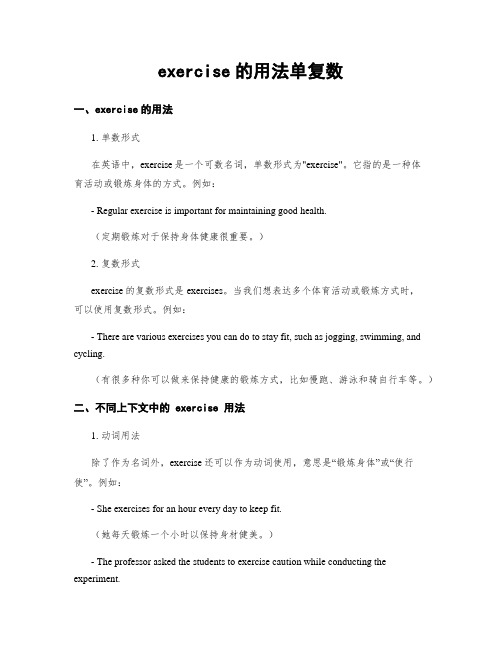
exercise的用法单复数一、exercise的用法1. 单数形式在英语中,exercise是一个可数名词,单数形式为"exercise"。
它指的是一种体育活动或锻炼身体的方式。
例如:- Regular exercise is important for maintaining good health.(定期锻炼对于保持身体健康很重要。
)2. 复数形式exercise的复数形式是exercises。
当我们想表达多个体育活动或锻炼方式时,可以使用复数形式。
例如:- There are various exercises you can do to stay fit, such as jogging, swimming, and cycling.(有很多种你可以做来保持健康的锻炼方式,比如慢跑、游泳和骑自行车等。
)二、不同上下文中的 exercise 用法1. 动词用法除了作为名词外,exercise还可以作为动词使用,意思是“锻炼身体”或“使行使”。
例如:- She exercises for an hour every day to keep fit.(她每天锻炼一个小时以保持身材健美。
)- The professor asked the students to exercise caution while conducting the experiment.(教授要求学生们在进行实验时小心谨慎。
)2. 专业领域中的用法在某些专业领域中,exercise还具有特殊含义。
2.1 医学领域在医学领域,exercise 可以表示“活动”或“功能性训练”。
例如:- Physical exercise is an important factor in the prevention of heart disease.(体育锻炼是预防心脏病的重要因素。
)2.2 语言学习中在语言学习中,exercise指的是一种练习材料,用于巩固和应用所学的知识。
八年级上册英语笔记

Unit1 How often do you exercise?Section ALange Goal: Talk about how often you do thing .标题释义:知识点 1. how often 的用法:1)how often 是“多久一次”的意思,常用频率副词(always, usually, often, sometimes, hardly ever, never), once a week , two or three times a month ,every day等词来回答。
如果对这些词划线部分提问,则用how often.2)how often 的同义词组是how many times (多少次),所以问句的同义句句是:How many times do you exercise ?3)但是how many times 与how often 的区别是how many times 通常只用once, twice, three times 等来回答。
eg. How often does she go to the movies ?------- Twice a monthHow many times do you watch TV every week ?------- Three times.4)补充:how long 是“多长时间”的意思,回答常用“for…”或”since …”引导的时间状语。
Eg. How long have you been in America ?“他在美国多久了”------- For two years .“两年了”how soon 是“还要多久才…”的意思,一般用将来时态,回答用“in …”引导的时间状语。
eg . How sooon will he be back ? “他多久回来“------- He will be back in an hours . “他一小时后回来”how much 也意为“多少”,但后面跟不可数名词,也对数量提问;同时还可用来询问价格“多少钱”的意思。
初中英语语法现在完成时练习题及答案

一、时态讲解:现在完成时(1)构成:现在完成时由助动词have +过去分词构成,助动词have有人称和数的变化。
第三人称单数用has,其余用have.现在完成时的否定式直接在助动词后面加上n o t、疑问式是把助动词提到主语之前。
以1)现在完成时诵常表示在说话之前已经完成的动作或存在的状态。
说话人强调的是该动作或状态对现在的结果或影响。
My daughter has just gone out.我女儿刚出去。
I ' m sure we ' ve met be我肯.定我们以前见过面。
She has arrived.她到了。
2) 表示持续到现在的动作或状态,往往和包括现在在内的表示一段时间的状语连用,女口recently, already, just, lately, for …,sinceyet-等。
如:I haven ' t heard from her these days这些日子我没有收到她的信。
We haven ' t seen you recently最近我们没有见到你。
They have bee n away for two years. 他们离开已经两年了。
She has bee n with us since Mon day.★注意:a) si nee和for的区别si nee 后接时间点,女口1993, last term, yesterday, the time I got therefor后接一段时间,表示长达多久”女口ten years, a while, two days等。
Exercise:用since 禾口for 填空1. Jim has bee n in Irela nd ____ Mon day.2. Jill has bee n in Irela nd ____ three days.3. His aunt has lived in Australia ____ 15 days.4. Mary is in her office. She has bee n there ___ 7 o'clock.5. In dia has bee n an in depe ndent country ___ 1974.6. The bus is late. They've bee n wait ing ____ 20 minu tes.7. Nobody lives in those houses. They have bee n empty _____ many years.8. Mike has bee n ill ____ a long time. He has bee n in hospital _____ October.2) 表示短暂意义的动词如arrive, leave, borrow, buy, begin, start, die等,在完成时当中不能和表示一段时间的状语连用,因为它们表示的动作不可能持续。
exercice和exercise的用法

exercise和exercises的用法
exercise和exercises词的用法:
1、exercise的基本含义是反复地进行某一动作或一系列动作,以发展和加强某种能力,尤指为了身体健康或精力充沛而进行的活动。
引申可表示“运用”“行使”或“实行”“执行”等。
2、exercise可用作及物动词,也可用作不及物动词。
用作及物动词时,接名词或代词作宾语。
3、exercise作“练习”解时,其后常接“反身代词+in+ n./v -ing”,其主语既是动作的执行者,又是动作的承受者。
exercise作名词统指“运动”时,前面加冠词特指“某项运动”。
4、exercise作名词指“习题”时,后面跟in和科目名称,或on/in和科目的部分的名称。
take exercise和exercise作不及物动词指“运动”或“体操”,而不是普通的练习。
exercise 读法英[ˈeksəsaɪz] 美[ˈeksərsaɪz]
n. 运动;练习;运用;操练;礼拜;典礼
vt. 锻炼;练习;使用;使忙碌;使惊恐
vi. 运动;练习
词汇搭配:
1、aerobic exercise 有氧运动
2、do exercise 锻炼;做运动;做练习
示例:
They are merely exercising their right to free speech. 他们仅仅是在行使言论自由的权利。
英语语法填空重难点(二)

语法填空重难点(二)➢ 超重点3 非谓语动词考点1 非谓语动词的用法区别[Exercise] 连线谓语动词前 主语 宾语 补语 表语 定语 状语及物动词(主动)后 及物动词(被动)后 句首或句尾,有逗号隔开宾语后 系动词后 n.词前后,修饰n.介词后考点2 非谓语动词作定语1 They(The panda keepers)talk to the flood of international visitors and to ____________(visit) Chinese zookeepers who often come to check on the pandas, which are on loan from China.2 Huangyao,one of the most ____________(visit)tourist spots in Guangxi, has a history of nearly 1,000 years with its origins dating back to the Song Dynasty.3 Most people would probably just see wheat straw as a pile of waste in a farmer's field. However, Wu Cui,an intangible cultural inheritor, can turn the straw left over from ____________(harvest) wheat into beautiful and eye -catching functional artworks.4 A 10-year -old boy has won a prestigious(有有有有)international wildlife photography competition for his shot of a spider ____________(make)its web in the light of passing tuk -tuk.5 It is the first time that the Chinese Terracotta Warriors have been exhibited abroad since 2019. Local people and visitors from all over the world will have a unique opportunity ____________(appreciate) the beauty of these archaeological achievements in one of the bestmuseums in Europe.6 I would say that the trip was worth every minute ____________(spend).考点3 非谓语动词作状语1 “There was once a town in the heart of America where all life seemed to enjoy peaceful co-existence with its surroundings,"her fable begins,____________ (borrow)some familiar words from many age-old fables.2 The drama Three-Body contains a lot of thoughts and knowledge inspired by China's traditional philosophy and culture, ____________(offer) a distinctive edge for homegrown tales in the world's sci-fi landscape.3 Sadly, his team arrived at Qomolangma Base Camp, only ____________(inform)that all journeys had been stopped because of an avalanche(雪崩)that had killed 16 people.4 The Indian living bridges grow stronger with time. These bridges only allowed 15 to 20 people to cross a day when first ____________(construct). After many years, the roots have strengthened, and can hold upwards of 50 people in one day.5 While ____________(prepare) meals, the Chinese may strive to balance the color, shape, and types of food they choose to eat.6 Chinese medicine might be slowly in curing the patient of the disease, but it has less serious side effects even if ____________(take) frequently, for each medicinal herb is prescribed (开处方) for the benefit of the patient,causing no harm to the liver or the kidneys.7 ____________ (give) these factors, it grew impossible for Chinese government to give away endlessly.附表评论性状语考点4 非谓语动词作补语1 Several nations have proposed that they wish to have their astronauts ____________(send) to the Tiangong space station.2 Horses,dragons,the Monkey King from Chinese legend, skeletons—you probably wouldn't expect to see this collection of animals and pop cultural icons ____________(fly) together in the sky,but this spectacle happens every year in Weifang, the"World Kite Capital"in Shandong Province.3 Rescuers found the scared child ____________(stand) in some vines and bushes in the jungle, so they immediately picked the child up and rushed back to the worried family.附表接不定式作宾补的动词(v.+sb.+to do)附表既可接不定式也可接分词作宾补的动词(v.+sb.+do/to do/doing/done)考点5 非谓语动词作主语、宾语、表语1 The terrain(地形)in these regions is mountainous,with jungles and waterfalls making any kind of permanent road structures impossible.This is why ____________(create) living bridges with the roots of living banyan trees is the most practical option.2 As the new immigrants gain financial independence and a greater knowledge of the surrounding city,they may choose ____________(stay)close to known friends and neighbors for comfort.3 The Diagram of Tai Chi,or the black and white, teardrop-shaped diagram of yin and yang,was derived from ____________(observe) shadows which were cast on a sundial( 日晷)at midday throughout the year.4 She didn't appear ____________(trouble).Instead,she seemed excited by the thought of one day becoming a flower.考点6 非谓语动词的时态与语态变化1 Nanxiang aside, the best xiao long bao have a fine skin, allowing them ____________ (lift) out of the steamer basket without tearing or spilling any of their contents.2 Tall and leafy,bamboo is an ideal plant for household courtyards and parks.It tolerates the heat of summer and the cold of winter,and it regenerates after ____________(cut).3 The quality of Longquan porcelain was previously thought____________(decline) in the late 15th century.4 The white building, ________(survive) threats to pull it down, is now a private house in thepossession of a retired professor.考点7 独立主格结构与with的复合结构1 Shenzhen's first coffee-themed post office opened at the Science and Technology Park in Nanshan District.Postal elements can be seen everywhere,with stamps,postcards and cakes in the shapes of mailboxes,mail carts and an old-style postman bicycle ____________(exhibit).2 Clones of different kinds are produced in various ways,and most are produced in the laboratory,with some of them ____________(occur)in several species in a natural way.当分词的逻辑主语跟句子的主语不一致时,就需要加上分词自己的逻辑主语,分词的逻辑主语不需要变化,此时构成独立主格结构,即。
- 1、下载文档前请自行甄别文档内容的完整性,平台不提供额外的编辑、内容补充、找答案等附加服务。
- 2、"仅部分预览"的文档,不可在线预览部分如存在完整性等问题,可反馈申请退款(可完整预览的文档不适用该条件!)。
- 3、如文档侵犯您的权益,请联系客服反馈,我们会尽快为您处理(人工客服工作时间:9:00-18:30)。
exercise的用法_用法辨析
exercise 用作动词,意为锻炼,运动。
用作不可数名词,表示锻炼,运动,如do/take exercise(做运动/锻炼身体)。
表示练习,体操时,是可数名词,用复数形式,如do morning exercises(做早操),do eye exercises(做眼保健操)等。
例句1. He exercises three times a week. 他每天锻炼三次。
(用作动词)
2. Walking is good exercise. 散步是很好的运动。
(用作不可数名词)
3. We do morning exercises every morning. 我们每天上午做早操。
(用作可数名词)
我们再看两道题:
1. He is very strong because he often e___ (根据句意及首字母完成单词).
答案:exercises
解题思路:exercise作动词时意为运动,锻炼。
在这个句子中缺少的是谓语动词,主语是表示第三人称单数的he,所以用动词的第三人称单数形式,因此填exercises。
2. It’s good for us to do ___ every day.
A. eye exercise
B. eye exercises
C. eyes exercise
D.
eyes exercises
答案:B
解题思路:exercise作体操,运动讲时常为exercises,选项A、C被排除,在英语中用名词修饰名词时,前边的名词须用单数形式,故选B。
